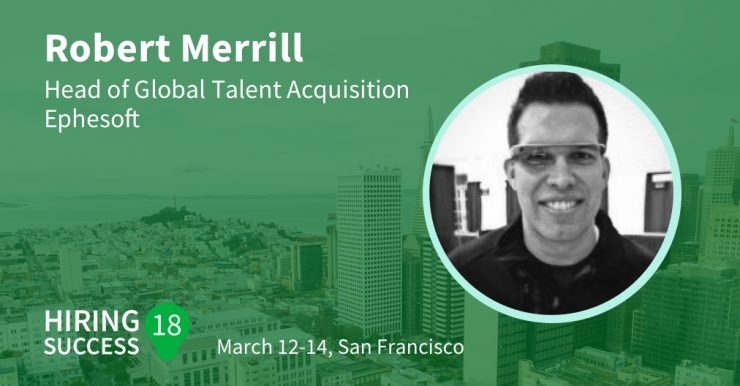It’s pleasant to remember the hire that made your team better, but try, for a moment, to recall the hires that made everything worse. The people who plunged your team into a death spiral and you kept for way too long.
Robert Merril wants you to remember why you hired those people – was the process rushed? Were you blinded by their perfect pedigree? Remeber why, so you don’t ever make those mistakes again. There’s no reason to, not with Robert around to help.
Not making that terrible hire is what Robert’s been helping companies do since 2001 as a consultant and as Head of Global Recruiting for Ephesoft. He fixes broken recruiting systems, helps companies improve their employer brand, improves candidate experience, and trains your hiring managers to do the same once he’s left.
He joins us at Hiring Success 18 March 12-14 in San Francisco (register here!) to share what he’s learned about building a hiring process from the ground up that results in quality, timely, and unbiased hires.
Get a preview of his session here and learn why his motto is ‘hire smart, manage tough’ and how he thinks recruiters can use technology better.
What does the concept of ‘Hiring Success’ mean to you?
Hire and retain great people from a diverse background of experiences and abilities. Smoothing the process of recruitment so that the candidate comes first and companies find themselves naturally avoiding biases in their decision making.
Explain ‘hire smart or manage tough’.
Any executive can point to a hire they’ve made who bolstered their team, drove results and improved things wherever they went. From a superstar salesperson that could close any deal, to an exceptionally detailed accountant. Often, these hires actually go unnoticed because they are so good at helping everything improve, people begin to think everything has always been this way. Everyone is happier, more loyal and productivity steadily improves across the team.
But there’s also the opposite. Bad fits, who left a wake of destruction. Most challenging, these hires are sometimes the most-refined interviewees, have the best pedigrees, or were a referral from someone important who passed the resume along with a wink and a nudge.
Some will look back admitting they were too fast to hire and then acted too slow in letting that person go, only realizing later the toll the person was taking on themselves and their team. ‘Hire Smart’ means making sure you take the time to find the right fit and ‘manage tough’ means you act quickly when the fit is bad.
What’s happening in a company that they would need to call you?
- You need to hire and you don’t know how to do it. Please don’t attempt this at home. Starting right will solve years of headaches down the road.
- You’re hiring too fast and you feel that the wrong people are joining… efficiency is replacing effectiveness. Or in other words, you fear the bar is being lowered.
- You look around the room and realize everyone has the same ideas, everyone is too congenial, always smiling at you, and nobody argues about anything (intelligently). If everyone agrees on EVERYTHING, that’s a clue you may not have enough diversity of thought happening within your team.
Where on the list of priorities should recruitment be?
Personally, it’s top on my list, because that’s what I do. I think most companies today will agree that to compete, you need to find great people and always be on the lookout for talent. Not always the very best people (pedigree, etc) but the people who will work best in that company and with that team.
How do you integrate onboarding and retention into the recruiting process? Or how can you recruit with that end goal in mind?
Salespeople say ‘always be closing’, or ‘ABC.’ I try to take the mindset of ‘ABO’ – ‘always be onboarding.’ I talk with the candidate as if they’re already here. I help them imagine what the first few months of the job will be like and the problems they will be able to solve. I follow that up with purposefully ensuring they get connected to key people they will rely on later in the first days and months of their job, as well as documents that walk them through the onboarding process. My HR partner and I collaborate weekly on onboarding.
How do recruiters use technology now?
Recruiters are scrappy and always trying to engage people wherever they can. However, HR department budgets seem to think of recruiting technology as a last resort. I think a baseline has to be a system of record for all candidates and all processes to flow from for recruiting. One that makes recruiters more productive, not less. One that engages people who are NOT recruiters. You know you’re winning when interviewers and hiring managers are using your recruiting tool, not just the people who are forced to use it!
…and what would you change?
I think messaging needs to improve. Text and chat are not going away and they could be harnessed more effectively than they are now. Especially around a core interface with, I hate to use this term, a unified messaging inbox. Also, video calls/voice and simple person-to-person conversations should be easier, not harder to do these days.
Scheduling is also still hard. Our lives are all digital, but getting a candidate booked on the calendar with the right people still takes a Ph.D. and a winning lotto ticket sometimes to pull it off. How do we ease that heavy-lifting?
We could do better learning from e-marketers about how to use tools to attract and delight passive candidates. We could use data more intelligently and in more real-time ways to hone our own skills.
We could talk to the candidate (customer) more. We could find ways to help them help us do our jobs better. We could aggressively find ways to lower the ‘iron curtain’ of HR secrecy and help candidates improve their interactions with us through better information sharing.
Why do face-to-face conferences matter in the digital age?
We still talk animatedly about that time we met someone influential in person. Interpersonal interaction is even more valuable now that we seem to have it less and less. As recruiting is more and more virtual, being able to sit around the proverbial camp-fire with war-hardened industry veterans is exciting. There’s no better place to generate great ideas than when smart people come together to discuss challenging things.






